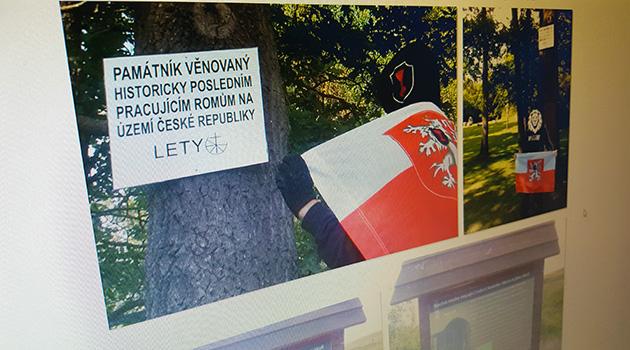Czech court postpones hearing in case of anti-Romani signs posted at site of former concentration camp to hear explanation of mobile phone data

On 27 September the District Court in Písek postponed the main hearing and presentation of evidence in the case of two men whom police say placed a sign with insulting inscriptions about Romani people on the grounds of the memorial to the Holocaust and its Romani victims at Lety u Písku. Judge Martin Král postponed the hearing until November in order to analyze information about movements of the defendants based on mobile phone records.
A police technician will explain the data about the mobile phone movements to the court. The men, aged 22 and 35, face sentences of between six months and three years in prison if found guilty of felony denial and approval of genocide.
The concentration camp near the village of Lety imprisoned Romani people prior to their deportation to Auschwitz during the Second World War. The sign with the insulting inscriptions was discovered by people on the grounds of the memorial at the close of May and start of June 2018.
News server Romea.cz drew attention to the case, reporting that the signs read “This memorial is dedicated to the last Romani people in history to ever work on the territory of the Czech Republic.” Romea.cz reported that the sign was installed at the memorial by the nationalist group “Us against All” (My proti všem).
Zbyněk Polívka, the prosecutor in Písek, charged Matouš Bulíř and Pavel Kozák in March of this year over the incident. Judge Král said on 27 September that the data about the mobile phone movements is essential evidence.
“The movements of the phone numbers make no sense with respect to the timeline of events, I will want the police technician to explain them,” the judge said. According to him, records show the numbers appearing first in Northern Bohemia and then suddenly in Southern Bohemia, and they continue to bounce all over the country at very brief intervals which the judge says “do not make sense”.
The hearing was therefore postponed so the judge can summon a police technician as a witness. Prosecutor Polívka told the Czech News Agency and Czech Television that they have to wait for the movements of the mobile phone numbers to be entered into evidence, as they are essential to his case.
“It’s true, the movements must be explained by the technician. The evidence is meant to demonstrate where the people involved were and eventually to refute their claims. During the first (court) hearing the data refuted their claims about their movements, one alleged he had been at Lety and the other cast doubt on that, this evidence should clarify what happened,” the prosecutor said.
Bulíř and Kozák, according to Polívka, documented their behavior when installing the insulting signs about Romani people by posting photographs of themselves doing so to a website. “Experts and witnesses have also expressed their views on that. It’s documented, I will summarize it in my closing remarks,” the prosecutor said.
Both the defendants and their attorneys refused to give a statement to the Czech News Agency about the case. According to historians, 1 308 children, men and women passed through the camp at Lety from August 1942 to May 1943, 327 of whom died there and more than 500 of whom were deported to the Auschwitz death camp.
After the war, fewer than 600 Romani concentration camp prisoners returned to Bohemia and Moravia. Experts estimate the Nazis murdered 90 % of the Roma indigenous to Bohemia and Moravia.
